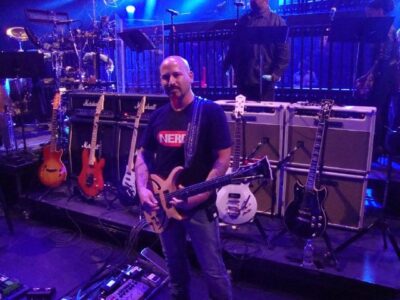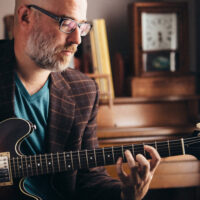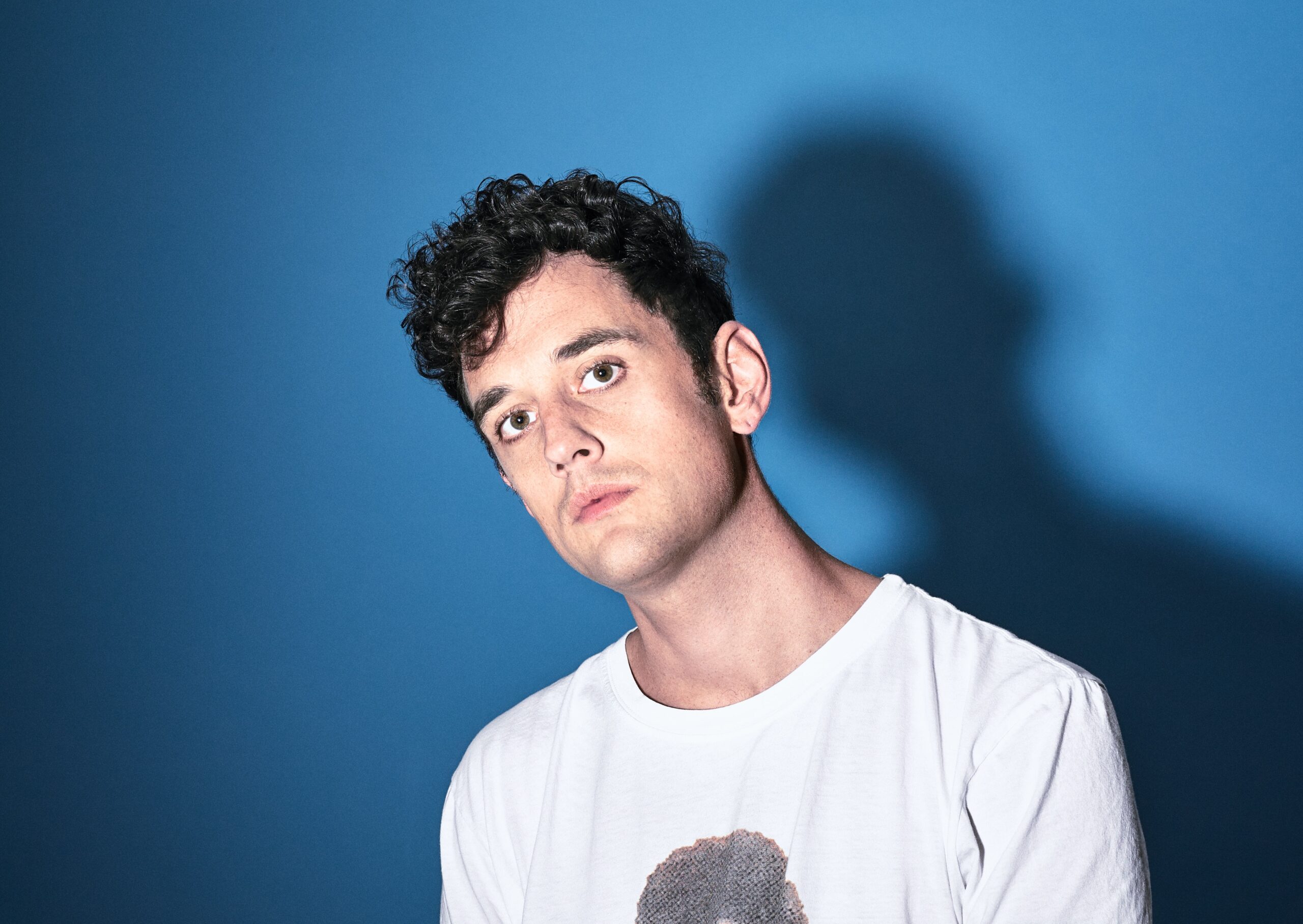Gig Advice from an A-List Hired Gun
This interview was first posted in January 2015.
Michael “Fish” Herring is a guitarist, songwriter and composer. A lifelong musician, he got his start at age five, taking violin lessons from his grandfather. When he was seven, he decided playing guitar was his calling and began to study the instrument and music theory diligently while attending the prestigious Settlement Music School and Performing Arts High School in Philadelphia. While there, he took jazz workshops and master classes with the late Grover Washington, Jr. and legend Stanley Clarke. By the time he graduated, he was already touring, recording in the studio and playing with established musicians with decades of experience. After playing with a variety of jazz, rock and funk bands in Philly, he began to tour the world playing guitar and make a name for himself as an in-demand studio musician. He has toured with superstar artists including Teena Marie, Dru Hill, Prince, Christina Aguilera and others and performed on Saturday Night Live, MTV, The Grammy Awards, The American Music Awards and The Tonight Show. Fish has also appeared on records for Mariah Carey, Tupac, Nas, LeeAnn Rimes and Celine Dion.

Fish talked about how he honed his craft and built a solid career in music. He also discussed what makes a great gig and shared some advice for artists who want to grow as artists in order to find long-lasting success in the industry.
MC:
Thanks for taking some time to talk, Fish. How did you first get into music and become an in-demand hired gun?
MFH:
It’s funny you put it that way, because I’m actually working on a documentary called Hired Gun right now. It’s tough to say exactly how I got started, because I have done nothing but music my entire life. My grandfather was a violinist, and he got me started on that. But I wanted to play guitar. I was around seven when I told him that guitar just felt like it was a part of me, and this was just what I wanted to do. Music chose me.
I started out with a lot of education and spent time learning the instrument. I studied with different teachers and at music schools. I went to Settlement Music School in Philly, which was pretty amazing. I got to work with a lot of really talented musicians like Grover Washington, Jr. and Stanley Clarke. Philly was a great place to grow up for music because it was so diverse. There was rock and roll, classical, jazz – everything was accessible. And that wasn’t true in every city at that time. I felt like I could do any type of music I wanted, and it made me develop real versatility.
I realized when I was pretty young that I wanted to play everything, and that this would really benefit me. I was asked to play so many different things: I was asked to play classical pieces, in funk groups, in psychedelic bands. And the ability to do anything also helped me when I started doing sessions at Philly International Records, because I didn’t necessarily know what I would be playing on. I just knew it would all be soul-related stuff.
MC:
And did you get these jobs through contacts from school?
MFH:
Yes. It was a combination of school contacts, friends and playing music with guys who were much older. When I was 16, I was playing with guys who were in their 30s. I learned so much from those guys, including what not to do.
MC:
Well, and I’d love to hear about that. Knowing what not to do is half the battle.
MFH:
Yes. It’s easy to get very short sighted, because it’s hard to imagine being a musician without having gigantic dreams. Everyone who is a musician has had big dreams of playing in an arena in front of thousands of people. That was definitely one of my dreams when I was a kid. Fortunately, I’ve had the opportunity to do that over and over again, and it’s still satisfying every time.
A lot of people get locked into a steady gig and think, “This is my gig. I have to do it.” They get locked into something local and don’t take any risks because they get comfortable. What a lot of people think is, “There’s no way I can break into something bigger.” And it’s true that it’s hard to break out and do something different. I still know plenty of guys who play on local levels all over the world. But if they don’t leave their comfort zone and try to do something different, their big dream is just not going to happen.
MC:
You’re a very literate musician too and have studied a lot of theory and technique. Many people resist that. Does being able to read music and sight read help you in your career?
MFH:
Absolutely. It helped me a lot more in the beginning, though it still helps when doing sessions. As an example, the other day I was in some eight-hour rehearsals for a gig I’m doing on New Year’s Eve, and there were charts for everything. That often happens when someone calls me to do a TV show as well. When you’re doing an awards show, and there are 90 pieces of music to play, there is no way to memorize it all. Everything is written. Knowing how to read, knowing music theory and having a really good understanding of how to communicate musical ideas are all key.
MC:
You’ve toured with many big-name, Grammy-winning artists. One that stands out to me is Prince, but you’ve played with a ton more. What were some of the highlights for you?
MFH:
Definitely Prince, because it was a huge learning experience. Hanging with him and getting to know him as a person instead of him as a superstar was really cool. Christina Aguilera has been another great one. I‘ve been working with her since 2001 and actually just did a show with her this month. Christina is an amazing artist with an incredible voice. I think she’s one of the greatest singers of her generation.
Teena Marie was my favorite person to work with as far as the live performance. She was an awesome musician and performer, so she really wanted her band to shine. Everybody in the band would get a spotlight. She was all about letting it flow and having a lot of fun on stage, and the show benefitted from it.
MC:
You’re a very flexible, talented and literate musician. What else do you think you did right that has led you to be the guy A-listers call for these gigs?
MFH:
I think the most important thing is to be able to get along with everybody. There have been guys I’ve worked with who are great musicians, but who I wouldn’t really hang out with otherwise. When you’re on the road, you’re in very close quarters. If you’re on a tour bus, you’re sleeping on top of someone or underneath someone, so you have to be able to get along. When you’re performing, you certainly have to be able to play and have the facility as a musician, but you also have to be able to be the person everyone wants to hang out with. I’m not saying I’m that guy, but I definitely fit in and can adapt.
MC:
That’s not easy in the cramped quarters you’re describing.
MFH:
The other thing that made the difference for me was knowing when to make the jump from one gig to the next.
MC:
In your opinion, what does that boil down to?
MFH:
I think it’s going with your gut and not being afraid to take risks. I was playing in a band with my best friends back in Philly in the late ‘80s and early ‘90s. It was awesome. We had dreams and goals. We were on a local level, but we were hoping to get bigger. We were writing, recording and performing, but that band did get locked into the local circuit. Another gig came up that was a local, steady gig, but I just had the feeling it was going to lead to bigger things. I jumped ship to take it, and my friends understood. It led to me meeting a lot of different people. One thing led to another, and I was in New York playing on someone else’s record. I started going to New York more often and working with people from Island Music. Next thing I knew, I was working with hit songwriters and playing on records that were on the radio.
MC:
Was that just about being the guy who was willing to say yes to every gig and showing up and playing well, or were there other factors?
MFH:
Kind of. It’s definitely hard for me to say no to a gig. I tend to say yes to most everything, because you never know what will turn out to be an incredible gig. A really cool gig is not always the highest-paying gig or the best musical situation. You never know what could turn into something great. I definitely have never turned things down.
MC:
I have a friend who takes any gig that has two of the three following qualifications: the music; the money; the “hang.” If any two of those elements are good, he will take it. Was the gig you took that led you to opportunities in New York one that was obviously a big shot, or was it just one that you thought had the potential to take you to interesting places?
MFH:
It was all of the above. I was working in a pretty big club in Philly, and there was a guy in a band who was a songwriter. I started working with him because the “hang” was great, and the music was really cool. I wasn’t as concerned with the money at that point because I had a gig. I spent a lot of time writing and recording with him, and it eventually led me to New York, working on records. I actually kind of got tossed around a little bit. I got passed around from producer to producer, and the more sessions I did, the more money I was able to demand.
There have definitely been some gigs I’ve taken and some records I’ve done with people I wouldn’t necessarily want to work with again. And there were some that just flat-out didn’t pay.
MC:
A lot of people find themselves in a situation where they are gigging and gigging, and nothing really clicks; they don’t end up getting passed around or recommended to producers and artists. What would your advice be to them?
MFH:
Never stop evolving. That’s something you have to continuously do as an artist. I still work on my craft. I don’t practice as much as I probably should, but when I have time between recording, shows and family, I play. I play to improve and to expand my mind. I’m constantly listening to different music and learning new skills.
MC:
I’m certainly not a professional musician, but I play bass. And when I pick up my bass, I find it hard not to fall into the same old things. It seems like that’s something you have to fight through if you want to be successful.
MFH:
The same rule applies to the business side of music too. You have to put yourself in different situations. I like to put myself in different situations musically, because I grow from them and learn from them. On the business side, I do the same thing, and it has often taken me somewhere new. Instead of getting locked into a local project or sticking with one band, I have often decided to go do something else, and it has given me some real opportunities.
As a musician, you have to change your surroundings. If you’re gigging and gigging and not getting anywhere, you need to change your surroundings.
MC:
Do you have advice for handling relationships with industry people?
MFH:
It seems like managing those relationships is getting even more difficult in this day and age. The jobs are dwindling. As far as musicians go, the label has always been the enemy, because it seems like they don’t respect the people who work on projects or tour with artists. Management might not look at touring support musicians as crucial. To them, everyone is expendable, so they don’t think about the person necessarily or the quality of the product being produced. And it is these musicians that completely change the quality of the show or the recording. If you’re just going to be a player, you have to be a bit of an asshole or have somebody behind you who can be an asshole so you can be the nice guy.
MC:
Is it about putting your foot down when it comes to compensation?
MFH:
Mainly, yes. And that’s something I’ve always had a hard time doing. Now I don’t have as much trouble, because I really don’t care what people think of me anymore. If you’re not going to pay me appropriately, then I’m not doing the gig, unless it’s something that really moves me or I feel there is a future in it.
For comparison’s sake, layers and doctors go to school for a certain amount of time to study their craft and demand a certain rate. Nobody says, “We’re just not going to pay you that much for this office visit,” or “We’re not going to pay you this hourly rate for your legal services.”
MC:
Of course not. You’re not going to negotiate with your brain surgeon on the operating table. Granted, the stakes are a bit higher in that case, but still.
MFH:
I think music is one of the very few occupations where people just expect that they will pay you less than your quote. If somebody calls me for a session, I tell them what my rates are. I have different rates for different services, and I have more of a sliding scale because of the way the business has changed since I started out. For example, I can do everything from my own studio now, easily, so that changes the game a little. Still, now, when someone calls from a label with a project, I give my rates, and the response is often, “Here’s what we can pay.” It wasn’t always like that.
MC:
Do you think labels do that now because there are so many people at a point of desperation who have been willing to compromise?
MFH:
Yes. People are willing to pay less and accept lesser quality. But I can’t compromise on quality, and I have to keep my head on straight. I can’t just go and do any gig for nothing, unless it’s a person or project I really care about.
MC:
Every corner of the music market is getting squeezed right now, but from what I hear, that “hired gun” market is one of the most affected. What are some other ways the music industry has changed in your experience?
MFH:
It seems like the quality of music has diminished. There are a lot of big arguments over that, but I personally can’t listen to what’s on Top 40 right now. Maybe I’m just getting old, but it doesn’t sound good to me. It’s not music that’s pleasing to my ears.
MC:
In the era of so much digital sampling, to me it often sounds like the same person over and over again.
MFH:
Exactly. It’s the same sounds, and a lot of it is coming out of Logic. Some of the biggest hits out there are actually using sounds from Garage Band or Fruity Loops.
I try and stay current on what’s happening in the music world, but it just troubles me more and more that I can’t find as many really superior artists. There used to be.
MC:
Doing what you do and being who you are, I’m sure you are more able than most to source outstanding musicianship and great recordings.
MFH:
Yes. And it’s out there, but it’s just not mainstream. When DJs become the hottest producers and highest-paid producers and the highest-paid performers, you know something is wrong. There are some DJs out there that will tell you that when they get half a million dollars for a big show, they are sometimes just pressing play. They are not actually mixing on the spot.
There is still a lot of great music out there, but unfortunately it’s mostly independent artists. Every once in a while someone like Sam Smith or Adele slips through – someone who is just performing really simple, good music that is listenable and doesn’t have the same exact sound on every song.
MC:
There are a lot of people stuck at a local level, or just getting out of school and banging their heads against the wall on the same old gigs. What advice do you have for them?
MFH:
First, work your craft. Don’t let it go. Always strive to get something better out of yourself as a player and improve.
The next bit of advice is to be versatile. If you want to work in any situation, you have to be prepared for it. For instance, I did a gig on New Year’s Eve with a project, Dessy Di Lauro, whose record I played on. Dessy’s partner is Ric’key Pageot, who is her husband and was Madonna’s keyboard player for a long time. They call their music “neo ragtime,” which is ‘30s ragtime mixed with modern R&B, hip-hop and rap music and is really interesting. I’m played banjo, slide guitar and used sounds I’ve never had to use before on other projects. Still, I have the ability. You have to be prepared so you’re ready if a gig like that comes up.
To learn more about Michael Fish Herring and his work, follow him on Twitter https://twitter.com/colorblindfish








